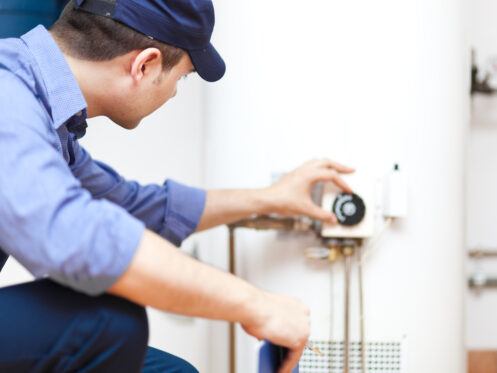For many years, standard, storage-based water heaters were the norm. Now, there may be a better and far more efficient way to heat water in your Norman, OK home. Tankless water heaters offer on-demand water heating. Given that these units don’t store pre-heated water indefinitely, they don’t experience the considerable and ongoing energy losses characteristic of traditional units. They also sustain far less wear over time and pose a far lower risk of water damage. Read on to find out how tankless water heaters stack up to storage-based models when it comes to overall performance.
The Nuances and Needs of Individual Households and Why They Matter
In some environments, heat pumps operate at 300% efficiency or higher. In the right conditions, they’re the most efficient heating and cooling solutions for residential properties by far. However, if you live in a region that regularly experiences below-freezing temperatures, your heat pump might ice over and fail outright. In exceedingly cold weather, heat pumps lose efficiency with each degree that the outside temperature drops. In short, what works well for one household won’t work well for all others. This is also true of water heaters.
Tankless, on-demand water heaters can be up to 34% more efficient than standard, storage-based water heaters in certain settings. The United States Department of Energy (DOE) recognizes these increases as being impacted by the amount of hot water that residents use. According to the DOE, you can enjoy up to 34% more efficiency with a tankless water heater if you use 41 gallons of hot water or less each day. However, for a household that uses 81 gallons or more, a tankless water heater will be just 8% to 14% more efficient than a traditional, storage-based unit.
Other Drawbacks of Going Tankless for Large, High-Demand Households
When it comes to hot water supply, storage-based water heaters are limited by the size of their tanks. When their hot water tanks are empty, building residents must wait between 30 and 90 minutes for their tanks to refill.
Tankless water heaters heat water as soon as it’s requested. They’re known for offering an unlimited water supply. However, in reality, neither equipment type is without limits. If you have a large household or frequently run your dishwasher, washing machine, and faucets at the same time, you may be better served by a traditional model. In large households, tankless water heaters can have a hard time keeping up with demand when multiple people, fixtures, or appliances require hot water at once.
Get Rid of Standby Energy Losses With Tankless Water Heating
When comparing tankless and tank-based water heaters for efficiency and performance, standby energy losses are easily the most important point to consider. These are energy losses that occur as water is held in tanks until it’s needed elsewhere. A new electric water heater can lose up to 1.4 kWh of energy. A gas-fired water heater with a pilot light can lose up to 8.4 kWh even when fully insulated. This is energy that homeowners pay for but never actually benefit from.
While homeowners with storage-based water heaters can minimize standby energy losses by insulating their water heaters and upgrading to units with electronic ignition switches, they can never completely eliminate it. Water that’s heated and then held in anticipation of use will always lose heat over time.
Standby Energy Losses Don’t End When You’re Away
Did you know that you’re paying to reheat water in your water heater’s storage tank even when you’re away at work or fast asleep? Without manual intervention, standby energy losses occur around the clock.
Tankless Water Heaters Don’t Experience Standby Energy Losses at All
Tankless water heaters never experience standby energy losses. These units distribute hot water as soon as it’s produced. Moreover, unlike older, gas-fired water heaters, modern, tankless models light their burners with electronic ignition switches. Thus, they aren’t constantly using fuel to keep their pilots lit.
Say Goodbye to Major In-Tank Corrosion and the Resulting Efficiency Losses
The average lifespan of a storage-based water heater is between 10 and 15 years. Many tankless water heaters are expected to last between 20 and 25 years. Storing water ages water heaters by increasing the risk of corrosion and gradually undermining heating components. Age and corrosion-related decreases in the overall integrity of storage-based water heaters are often most severe in homes with hard water or water with high concentrations of dissolved minerals. When excessive, corrosion can impact gas burners and heat exchangers and make them less effective in converting fuel into heat energy.
Tankless Water Heaters Are Easily the More Efficient Choice
While tankless water heaters can’t keep up with the hot water demands of all households, they’re more efficient than storage-based models in nearly all settings. Households that use 41 gallons of hot water or less each day will experience the greatest difference in their energy bills, but nearly all homeowners will see a noticeable decrease. When you upgrade to a tankless water heater, you won’t have to spend money to regularly reheat water that you aren’t using right away.
Safety, Value, and Convenience
Even with fast-rising energy prices, efficiency isn’t everything. Consumers’ biggest complaint about their water heaters is often their limited capacity. After all, there’s nothing quite like pining away for a hot bath or shower only to find that the water at your taps is cold or lukewarm.
Tankless water heaters are often hailed as offering an unlimited hot water supply, but you might not get the hot water you need if you have a tankless unit and lots of people drawing from it at the same time. The good news is that plumbers can streamline tankless water heating plans to suit the needs of every household. For instance, while a single tankless water heater might not be sufficient for meeting your household’s ongoing hot water demand, two tankless water heaters should be. In large, multi-story properties, having two tankless units installed often works best. In terms of ongoing operating costs, it can also be both cheaper and more efficient than having a single, storage-based model.
Never Worry About Tank Ruptures Again
Tank-based water heaters contain hot, highly pressurized water all of the time. They also sustain ongoing corrosion-related damages that are only mitigated by slim, sacrificial anode rods. If you’ve ever had a storage-based water heater rupture and spill its contents on your floors, you’ll love the increased safety and convenience of tankless designs. While tankless water heaters aren’t impervious to problems like rust or leaking, they’re far less likely to cause the widespread property damages that traditional models can.
Is a Tankless Water Heater Right for You?
If you’re looking for a way to cut your household’s carbon footprint and reduce your energy bill, having a tankless water heater installed could help you accomplish both goals. However, with more water-reliant appliances and residents to serve, your home may require more than one tankless water heater to get the job done.
We offer expert cooling, heating, plumbing, and electrical services in Norman, OK and the surrounding cities. You can count on us for top-quality water heaters and water softening equipment, whole-house surge protection, and cutting-edge indoor air quality improvements. To experience the benefits of tankless water heating firsthand, get in touch with Norman Air today.

